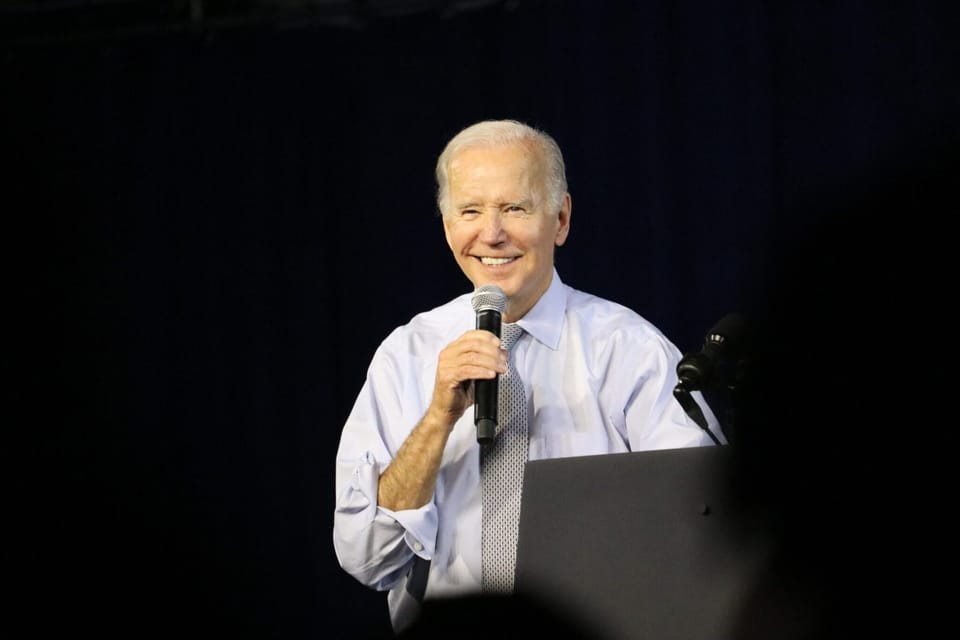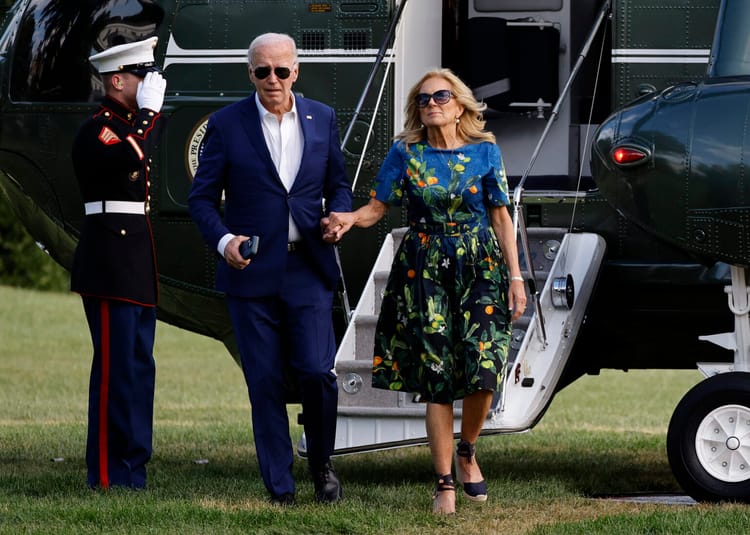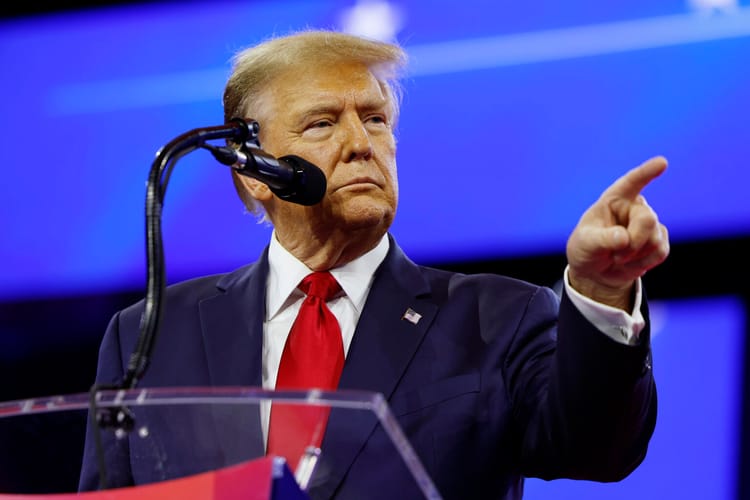No prosecution of Biden in classified documents case, DOJ special counsel says in report

By Jennifer Shutt, Minnesota Reformer
WASHINGTON — The U.S. Justice Department released a lengthy report Thursday concluding that while President Joe Biden “willfully retained” classified materials following his time as vice president, he won’t be charged with a crime.
Special Counsel Robert K. Hur wrote in the 388-page report that prosecutors considered “that, at trial, Mr. Biden would likely present himself to a jury, as he did during our interview of him, as a sympathetic, well-meaning, elderly man with a poor memory.”
“Based on our direct interactions with and observations of him, he is someone for whom many jurors will want to identify reasonable doubt,” the report states. “It would be difficult to convince a jury that they should convict him — by then a former president well into his eighties — of a serious felony that requires a mental state of willfulness.”
“We conclude the evidence is not sufficient to convict, and we decline to recommend prosecution of Mr. Biden for his retention of the classified Afghanistan documents,” the report states.
It says, “Our investigation uncovered evidence that President Biden willfully retained and disclosed classified materials after his vice presidency when he was a private citizen.”
Biden in a press conference called Thursday night hit back at this characterization and others, including an assertion in the report he “did not remember, even within several years, when his son Beau died.”
“I know there’s some attention paid to some language in the report about my recollection of events,” Biden said. “There’s even reference that I don’t remember when my son died.”
“How in the hell dare he raise that,” he said, adding that he still wears his son Beau’s rosary, and said he “does not need anyone to remind me of when he passed away.”
While he took a few questions from the press about the report and about Israel, he was often combative.
“I’m well-meaning and I’m an elderly man, and I know what the hell I’m doing,” he said. “My memory is fine.”
One reporter asked the president why he was confusing the names of world leaders.
Biden, addressing the hostage negotiations between Israel and Hamas, noted that Israel’s response to Hamas in Gaza “has been over the top,” and argued that he helped negotiate allowing humanitarian aid through Egypt by talking with Egypt’s president, Abdel Fattah El-Sisi, to open those borders.
However, he instead referred to El-Sisi as the president of Mexico.
“Initially the president of Mexico, Sisi, did not want to open up the gate to allow humanitarian aid to get in, I talked to him, I convinced him to open the gate,” Biden said.
Executive privilege
Attorney General Merrick Garland wrote in a one-page letter to Congress that Biden “has decided not to assert executive privilege over any part of the report or its appendices.” The doctrine of executive privilege allows the president to withhold certain documents or information from the judicial or legislative branches.
The Hur report seeks to differentiate between the Biden investigation and another of former President Donald Trump’s handling of documents, which did lead to charges, saying there are “several material distinctions.”
“Unlike the evidence involving Mr. Biden, the allegations set forth in the indictment of Mr. Trump, if proven, would present serious aggravating facts,” the report says. “Most notably, after being given multiple chances to return classified documents and avoid prosecution, Mr. Trump allegedly did the opposite.”
The report adds that Trump allegedly “obstructed justice by enlisting others to destroy evidence and then to lie about it.”
“In contrast, Mr. Biden turned in classified documents to the National Archives and the Department of Justice, consented to the search of multiple locations including his homes, sat for a voluntary interview. and in other ways cooperated with the investigation,” the report added.
The announcement quickly provoked a reaction from Trump, who in a written statement released by his campaign said the two cases are significantly different and that he “did nothing wrong.”
Trump alleged there is a “two-tiered system of Justice” and called for the special counsel in his case to drop it immediately, saying it represents “election interference.”
Biden says he ‘threw up no roadblocks’
Biden said in a written statement that he was “pleased to see they reached the conclusion I believed all along they would reach — that there would be no charges brought in this case and the matter is now closed.”
“This was an exhaustive investigation going back more than 40 years, even into the 1970s when I was a young Senator,” Biden said. “I cooperated completely, threw up no roadblocks, and sought no delays.”
Biden noted in his statement that he sat for five hours of interviews with the special counsel on Oct. 8 and 9, 2023, the two days following the terrorist attacks in Israel. He reiterated that at his press conference Thursday night.
While he was “in the middle of handling an international crisis,” Biden said that he “believed that’s what I owed the American people so they could know no charges would be brought and the matter closed.”
Garland announced Hur as the special counsel in January 2023; Trump had appointed Hur to lead the prosecutor’s office in Maryland in 2018. He left in 2021 to join the Gibson, Dunn & Crutcher law firm.
The announcement of the special counsel came after classified documents were found at the Penn Biden Center in Washington, D.C., on Nov. 2, 2022 and then in the garage at Biden’s home in Wilmington, Delaware, on Dec. 20, 2022 and Jan. 11 and Jan. 12, 2023.
The White House defended its decisions to delay revealing that information publicly in mid-January 2023 shortly after the special counsel was publicly appointed.
Ian Sams, White House spokesman for oversight and investigations, said at the time the administration understood “that there’s a tension between the need to be cooperative with an ongoing DOJ investigation, and rightful demands for additional public information.”
“And so we’re trying to strike that balance and being as clear as we can,” Sams said.
‘Mistakes when packing documents’
Special Counsel to the President Richard Sauber said in a written statement released Thursday that Biden cooperated with investigators and that the report acknowledges “mistakes when packing documents at the end of an Administration or when Members of Congress leave office are unfortunately a common occurrence.”
“Now that this investigation has concluded, President Biden plans to take new, substantive action to help prevent such mistakes in the future and will announce it soon,” Sauber said.
Bob Bauer, personal counsel to Biden, said in a written statement that the special counsel’s decision “rested on evidence compiled using millions of taxpayer dollars over a 15-month inquiry involving 173 interviews of 147 witnesses and more than 7 million documents.”
“He specifically noted that he would have reached the same conclusion even if the President were a private citizen and not the sitting president,” Bauer said.
“The Special Counsel also noted the President’s complete cooperation, including the President’s unprecedented decision to open up every room of his family home and beach house to comprehensive FBI searches as well as a voluntary interview conducted over two days.”
Ariana Figueroa contributed to this report.
Minnesota Reformer is part of States Newsroom, a network of news bureaus supported by grants and a coalition of donors as a 501c(3) public charity. Minnesota Reformer maintains editorial independence. Contact Editor Patrick Coolican for questions: info@minnesotareformer.com. Follow Minnesota Reformer on Facebook and Twitter.




Member discussion